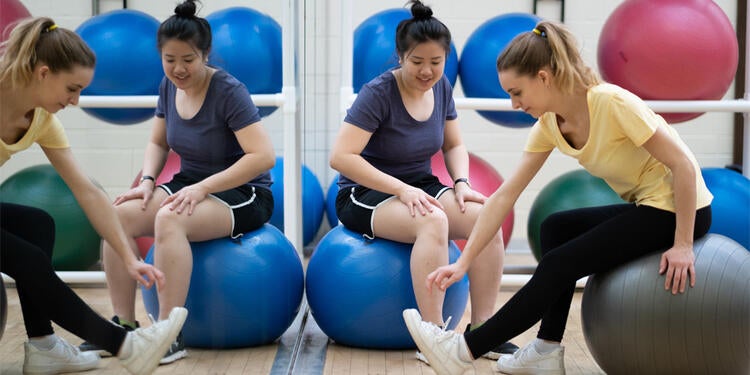
Esther always knew she wanted to help people. In high school, she envisioned studying for a career in nursing. Then a co-op class had her working at a therapy centre for kids with autism, and everything changed.
“I experienced first-hand the role recreation plays in therapy, how it can bring meaning to a person’s life, and that I can make it happen,” says Esther, a Therapeutic Recreation major in the Faculty of Health.
The class did more than expose Esther to therapeutic recreation; it showed her the intrinsic, unique value of a co-op program. So when it came time to apply for school, Waterloo was at the top of the list. One of only three schools in Ontario offering a degree in therapeutic recreation — “we call it TR,” says Esther — Waterloo is the only one to combine co-op with academics.
The benefits of experience
“Co-op does more than provide contacts and experience for your resumé. I think this is especially true in my program, where learning about mental health means being around people with mental health issues. My profs will simulate what it’s like to work in the field, with case studies and group projects, but it’s through real-world exposure that I’ve gained my deepest insights.”
Now in her third year, Esther is about to embark on her third co-op term, at Sunnybrook Health Sciences Centre in Toronto. “I’ll be working in the veteran’s wing, developing patient-specific recreation programs covering the spectrum of wellbeing, from mental, physical, and emotional wellbeing, to social, spiritual, and intellectual.”
It’s through real-world exposure that I’ve gained my deepest insights.
Supporting patients
It will be her second term working in a hospital, the first of which took her to a hospital in Ottawa, where she built relationships and recreation programs for patients with schizophrenia. “We’d go for walks, do arts and crafts, baking, exercise. We’d talk about life, about what it’s like to live with the mental illness — the stigma.”
I literally get paid to have fun. How cool is that?

It was a formative experience, not only with the patients, but living in a new city five hours away from home. “I learned to be independent, and when I got back to campus, I was much more mindful of why I was at Waterloo, and why studying ways to improve wellbeing is so important.”
Discover if Therapeutic Recreation is right for you.
Diversifying her degree
For her second co-op term, Esther boarded a plane for Hong Kong, where her grandmother lives and where she worked teaching English to kids. “Working and studying abroad was another big reason for choosing Waterloo. Not only does the school promote this, but they also helped me through the process, from getting a student visa and making sure I had all the paperwork, to steering me in the direction of a scholarship, which helped pay for it all.”
Working and studying abroad was another big reason for choosing Waterloo.
But while Esther enjoys her time away, she loves returning to campus. “Waterloo is the perfect mix of big and small city,” she says. It helps that her program is so flexible, allowing her to add psychology as a minor, and to choose from a wide array of electives. “I’ve taken courses in Mandarin, physiology, and sexuality and marriage.”
Between classes, Esther loves hanging with friends and taking part in campus clubs, such as the International Justice Mission and the Chinese Christian Fellowship.
“Because TR is so new, even some of my friends don’t know what it is,” says Esther. “I tell people, I literally get paid to have fun. How cool is that?”




